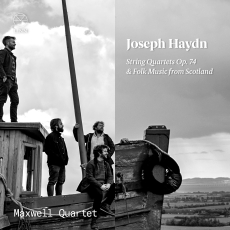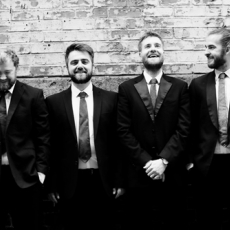Maxwell Quartet - Haydn: String Quartets Op. 74 - Folk Music from Scotland - Vox Carnyx
Listen to just the first two chords on this new Linn release by the Maxwell Quartet and you might be forgiven for thinking a good old Scottish ceilidh was about to spring into action. But these “gathering notes” are not the typical call-to-attention we associate with a traditional reel or jig, they are heralding the first of Haydn’s Op 74 string quartets, the spinal column of this cheerful new album featuring all three of the 1793 set.
How fortuitous is that primitive cadential opening to No 1, when the other side to this Classical offering is an interspersion of Scots folk music? The Maxwell’s have made a thing of mixing in their own arrangements of the latter in their live concerts. This Caledonian sprinkling is just as refreshing and invigorating in the recorded context.
But let’s start with the triptych of Haydn quartets, the Op 74 set, that fully complements the three Op 71s featured on the Maxwell’s Linn debut disc a couple of years ago, which also contains Scots fiddle tune arrangements. Both Haydn sets resulted from his first highly-successful London trip of 1791, where his experience of dedicated chamber music concerts (as opposed to the more restrained drawing room practices of his native Austria) elicited a spring-like creative response from the sexagenarian composer.
The Maxwells capture that buoyancy in all three works. The first C major quartet’s unquenchable exuberance, delivered with an enlivening grainy tonal edge, is tempered by moments of deep thinking, even probing darkness, such as the psychologically offsetting key shift that establishes the opening Allegro’s more plangent development.
The second F major quartet has its own mysteries to fathom, its subtler nuances to shape, not so much in the two straightforward central movements as in the outermost ones, the boisterous finale in particular applying Mozartian trickery through mischievous structural and harmonic surprises, as if Haydn was honouring his recently deceased compatriot. The opening bars of the final G minor “Rider” quartet, the best known of the set, conjures up an enigmatic spirit more akin to – or rather preemptive of – Beethoven, which the Maxwells latch onto craftily, setting a high bar for a truly exhilarating performance.
Against all that are the Scots numbers, beautiful and wholesome arrangements by the ensemble itself, from the gracious father-son “classicism” of Niel and Nathaniel Gow (the latter’s melting air, Coilsfield House, raptly arranged), to the gorgeously lilting Fear a’ Bhàta, a frisky Shetland jig Da Full Rigged Ship and haunting swagger of The Burning of the Piper’s Hut, anonymous and thought to date back to the Highland Clearances.
The magic of this album is the way these two musical traditions knit so effectively together. Haydn never visited Scotland (although he did arrange Burns’ songs for the 18th century Edinburgh publisher George Thomson) but if he had his music would have had Enlightenment Scotland dancing in the streets.

